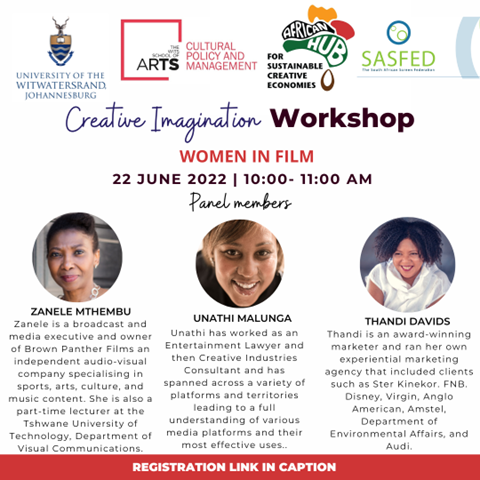Written by Vuyo Madyibi (SA Hub Creative Partnerships Coordinator).

Today’s workshop, chaired by Avril Joffe focused on the theme of Women in Film to address systemic barriers and issues facing women who want to pursue careers in film. Specifically, we explored the potential of tailoring support programs, employment standards and regulations to enable women to progress in the film industry to achieve gender parity.
The discussion began with an introduction to SACO’s research on women in film by Prof Urmilla Bob. During her presentation, she discussed issues of gender inequality and the underrepresentation of women in the audio-visual industry. She stressed that content and representation of women are key issues, especially in relation to differences, content, and female themes that often restrict creativity and content when women are solely focused on women’s issues. Moreover, women tend to be employed in part-time, contract-based positions in the audio-visual sector, but very few of these opportunities are available to them which is problematic. To read more about SACO’s research, click here.
In her presentation, Zanele Mthembu, who has been in the industry for 29 years pointed out that she is in preferment and does what she prefers to do. She was executive head of Newsroom Africa, head of the Content Division at eMedia and has worked for Discovery Communications. Despite reaching the highest heights of her career, she still faces many challenges as a black woman over 50, and those challenges have evolved as she has progressed in her career. Her latest challenge is that some people think she is too old and that she should be moving and making room for young people. Other people see value in her and it is in how she has used those challenges more as steppingstones to get to where she wants to get to.
Thandi Davids began her career in public relations and was recruited to join the Independent Broadcasting Authority shortly after it was established in 1994. She stated that it took her 20 years to get to the point where she could produce. She has served on National Geographic and Fox boardrooms as the only female and person of colour. As a result of her understanding of the business side of broadcasting and filming, she became a producer. In her remarks, she noted that working in the boardroom as a woman is difficult because it is a male-dominated environment and stories that emerge from these boardrooms are male oriented. She stressed the importance of back-end research on gender perspectives and the true representation of female stories both onscreen and off screen.
Women starting a business in the film industry has both pros and cons, says Londeka Mlawuza, an independent filmmaker. According to her, there are no cons, but more pros since freelancers become their own businesses. For Londeka, building networks is a key component of turning your freelance career into a business in that networking is essential to establishing a business. Additionally, freelancers have the possibility of building their assets and resource bases. The process of building a business in the industry involves more than just registering a business production house; it also involves building partnerships with other production houses. Finally, we should not stand in the way of our careers as women in film, says Londeka.
In today’s era of intellectual assets, Unathi Malunga discusses the lack of business and soft skills in the film industry. Most filmmakers just want to tell stories but are unable to convert their IP into wealth. Another area in which filmmakers lack knowledge is risk management since HEIs teach from a theoretical rather than a practical perspective. Furthermore, she said sector organizations like SASFED provide professional development, training, and information-sharing opportunities for the industry. As SMMEs are the main creators of work, there is also a need to develop sustainable businesses, since these businesses develop financial literacy, legal knowledge, and risk management expertise through their work.
In his reflection on the presentations, Tonderai Chiyindiko acknowledged that men in the film industry perpetuate gender inequality by not speaking up and calling each other out. Sivu Giba commented that being a female filmmaker based in an underdeveloped province like the Eastern Cape makes it tough to express her views and promote her content. Dimakatso Qocha expressed concerns about potential funders overlooking newly qualified producers in favour of more experienced and well-known ones. In response to Dimakatso, Unathi Malunga said they have discussed this with streamers like Netflix that have come into the country, who for now only want to work with people they know and have requested that a pipeline be set up. Taking part in collaborative projects is the solution Thandi Davids offers young producers in this regard. Zanele Mthembu echoed Thandi David’s point and stressed the importance of collaboration. The word for the day is definitely collaboration.
The SA Hub extends a special thanks to our guest speakers; Professor Urmila Bob, Zanele Mthembu, Thandi Davids, Londeka Mlawuza and Unathi Malunga for their valuable insights. Lastly, we thank our local partners; the South African Cultural Observatory, the South African Screen Federation, and the Tshimologong Digital Precinct.
The full workshop programme can be downloaded here below.
